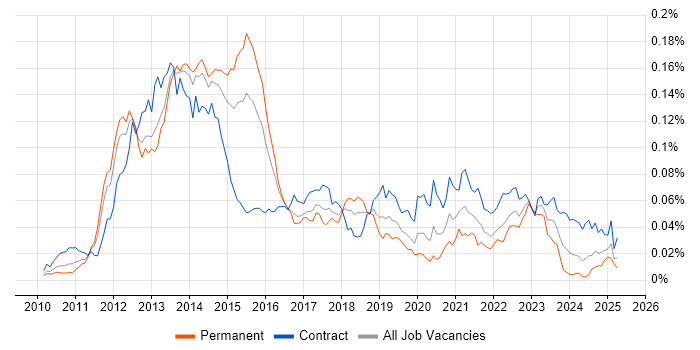Oracle Exadata
UK
The table below provides summary statistics and salary benchmarking for jobs requiring Oracle Exadata skills. It covers vacancies from the 6 months leading up to 12 September 2025, with comparisons to the same periods in the previous two years.
| 6 months to 12 Sep 2025 |
Same period 2024 | Same period 2023 | |
|---|---|---|---|
| Rank | 668 | 796 | 737 |
| Rank change year-on-year | +128 | -59 | +413 |
| Permanent jobs citing Oracle Exadata | 7 | 3 | 34 |
| As % of all permanent jobs advertised in the UK | 0.014% | 0.004% | 0.055% |
| As % of the Database & Business Intelligence category | 0.097% | 0.025% | 0.26% |
| Number of salaries quoted | 4 | 3 | 28 |
| 10th Percentile | £81,375 | £67,300 | - |
| 25th Percentile | £119,063 | £68,313 | £39,294 |
| Median annual salary (50th Percentile) | £140,000 | £70,000 | £40,356 |
| Median % change year-on-year | +100.00% | +73.46% | -42.35% |
| 75th Percentile | - | £70,438 | £41,418 |
| 90th Percentile | - | £70,700 | £64,875 |
| UK excluding London median annual salary | - | £68,750 | £40,356 |
| % change year-on-year | - | +70.36% | -31.89% |
All Database and Business Intelligence Skills
UK
Oracle Exadata falls under the Databases and Business Intelligence category. For comparison with the information above, the following table provides summary statistics for all permanent job vacancies requiring database or business intelligence skills.
| Permanent vacancies with a requirement for database or business intelligence skills | 7,241 | 12,171 | 13,135 |
| As % of all permanent jobs advertised in the UK | 14.60% | 15.49% | 21.08% |
| Number of salaries quoted | 4,543 | 7,309 | 10,441 |
| 10th Percentile | £33,750 | £37,500 | £37,500 |
| 25th Percentile | £45,000 | £46,250 | £47,500 |
| Median annual salary (50th Percentile) | £60,000 | £62,500 | £62,500 |
| Median % change year-on-year | -4.00% | - | +4.17% |
| 75th Percentile | £80,000 | £85,000 | £80,000 |
| 90th Percentile | £107,500 | £115,000 | £97,500 |
| UK excluding London median annual salary | £53,000 | £52,500 | £55,000 |
| % change year-on-year | +0.95% | -4.55% | +4.76% |
Oracle Exadata
Job Vacancy Trend
Job postings citing Oracle Exadata as a proportion of all IT jobs advertised.

Oracle Exadata
Salary Trend
Salary distribution trend for jobs in the UK citing Oracle Exadata.

Oracle Exadata
Salary Histogram
Salary distribution for jobs citing Oracle Exadata over the 6 months to 12 September 2025.
Oracle Exadata
Top 2 Job Locations
The table below looks at the demand and provides a guide to the median salaries quoted in IT jobs citing Oracle Exadata within the UK over the 6 months to 12 September 2025. The 'Rank Change' column provides an indication of the change in demand within each location based on the same 6 month period last year.
| Location | Rank Change on Same Period Last Year |
Matching Permanent IT Job Ads |
Median Salary Past 6 Months |
Median Salary % Change on Same Period Last Year |
Live Jobs |
|---|---|---|---|---|---|
| England | +122 | 7 | £140,000 | +100.00% | 2 |
| London | +79 | 7 | £140,000 | +100.00% |
Oracle Exadata
Co-occurring Skills and Capabilities by Category
The follow tables expand on the table above by listing co-occurrences grouped by category. The same employment type, locality and period is covered with up to 20 co-occurrences shown in each of the following categories:
